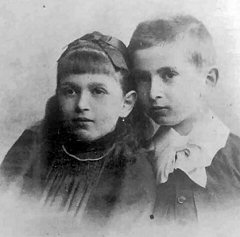Dora (case study)
Dora is a pseudonym given by Sigmund Freud to Ida Bauer (1882–1945), who was an Austrian woman whose case study was published by Freud in 1905 under the title "Fragment of an Analysis of a Case of Hysteria". The case of Dora is one of Freud's most famous and is considered a landmark in the development of his psychoanalytic theory. Dora's case is often discussed in the context of hysteria, dream analysis, and Freud's theory of the Oedipus complex.
Background[edit | edit source]
Dora was 18 years old when she was brought to Freud by her father in 1900. She was suffering from a variety of symptoms including aphonia (loss of voice), nervous coughing, and migraine headaches. Freud diagnosed her condition as hysteria, attributing her symptoms to repressed emotions and sexual conflicts from her childhood.
Case Study[edit | edit source]
The case study revolves around Dora's relationships with her family and with a family friend, Herr K. Freud interpreted Dora's symptoms as manifestations of her repressed sexual desires and unresolved Oedipal conflict. He suggested that Dora was in love with Herr K., who had made sexual advances towards her, and was jealous of her father's alleged affair with Herr K.'s wife.
Freud's analysis also delved into Dora's dreams, which he used to support his theory of the unconscious and the significance of dreams in understanding repressed desires. One of the most famous aspects of the case study is Freud's interpretation of a dream Dora had about a house on fire, which he linked to her anxiety about her relationship with Herr K. and her family.
Criticism and Legacy[edit | edit source]
The Dora case has been subject to extensive criticism, particularly from feminist scholars who argue that Freud's analysis was gender-biased and overlooked the possibility of actual sexual abuse. Critics also point out that Freud's interpretation was heavily influenced by his own theories, potentially leading to confirmation bias.
Despite the criticisms, the Dora case remains a pivotal moment in the history of psychoanalysis. It is frequently studied in psychology, psychoanalysis, and gender studies for its insights into Freud's methods and the historical context of psychoanalytic theory.
Conclusion[edit | edit source]
The Dora case study is a complex and controversial example of Freud's early psychoanalytic work. It highlights the challenges of interpreting psychological symptoms through the lens of sexual and emotional conflicts. While the case has its critics, it also underscores the importance of understanding the psychological underpinnings of physical symptoms and the role of the unconscious in shaping human behavior.
Navigation: Wellness - Encyclopedia - Health topics - Disease Index - Drugs - World Directory - Gray's Anatomy - Keto diet - Recipes
Search WikiMD
Ad.Tired of being Overweight? Try W8MD's physician weight loss program.
Semaglutide (Ozempic / Wegovy and Tirzepatide (Mounjaro / Zepbound) available.
Advertise on WikiMD
WikiMD is not a substitute for professional medical advice. See full disclaimer.
Credits:Most images are courtesy of Wikimedia commons, and templates Wikipedia, licensed under CC BY SA or similar.Contributors: Prab R. Tumpati, MD

